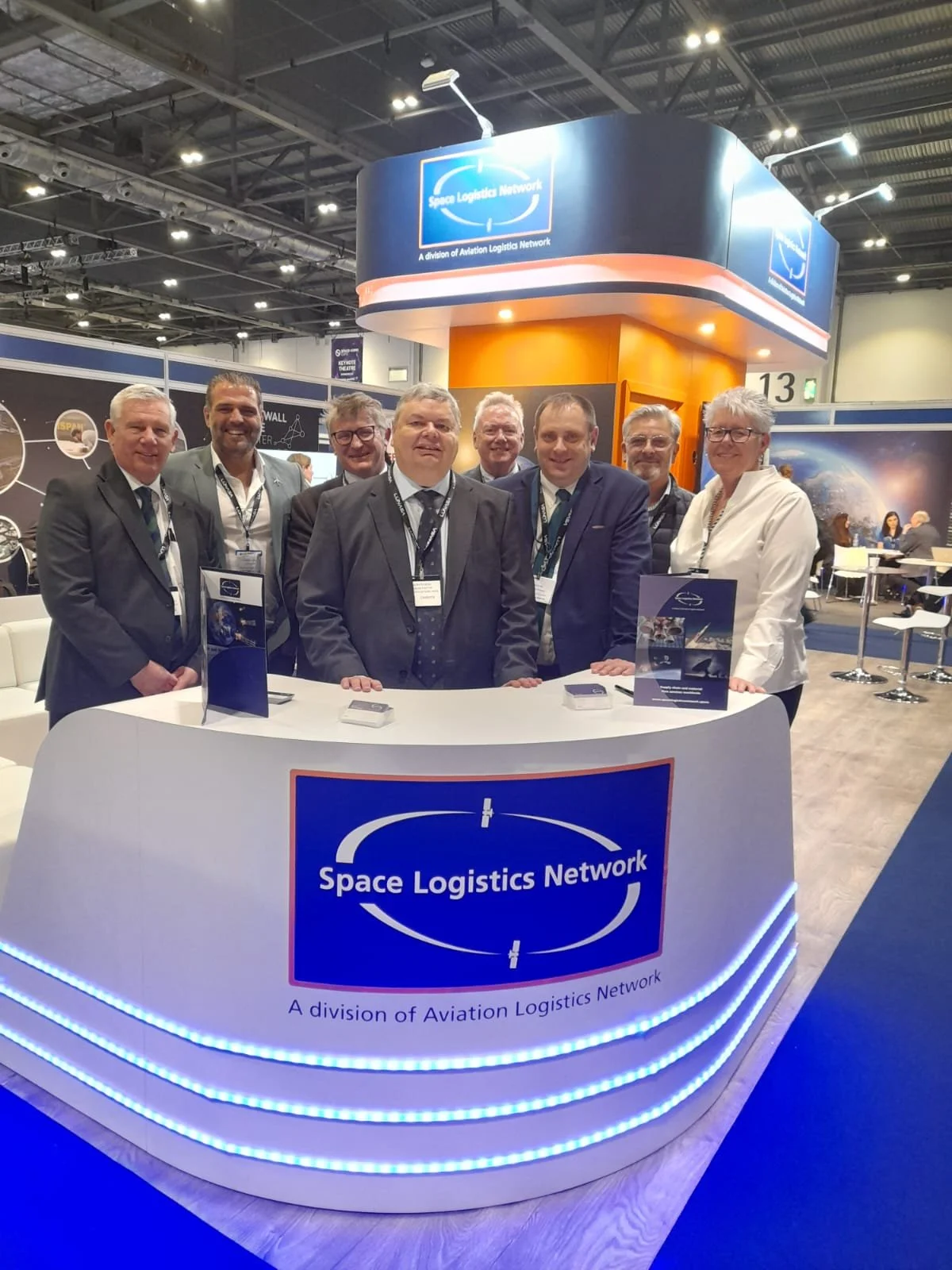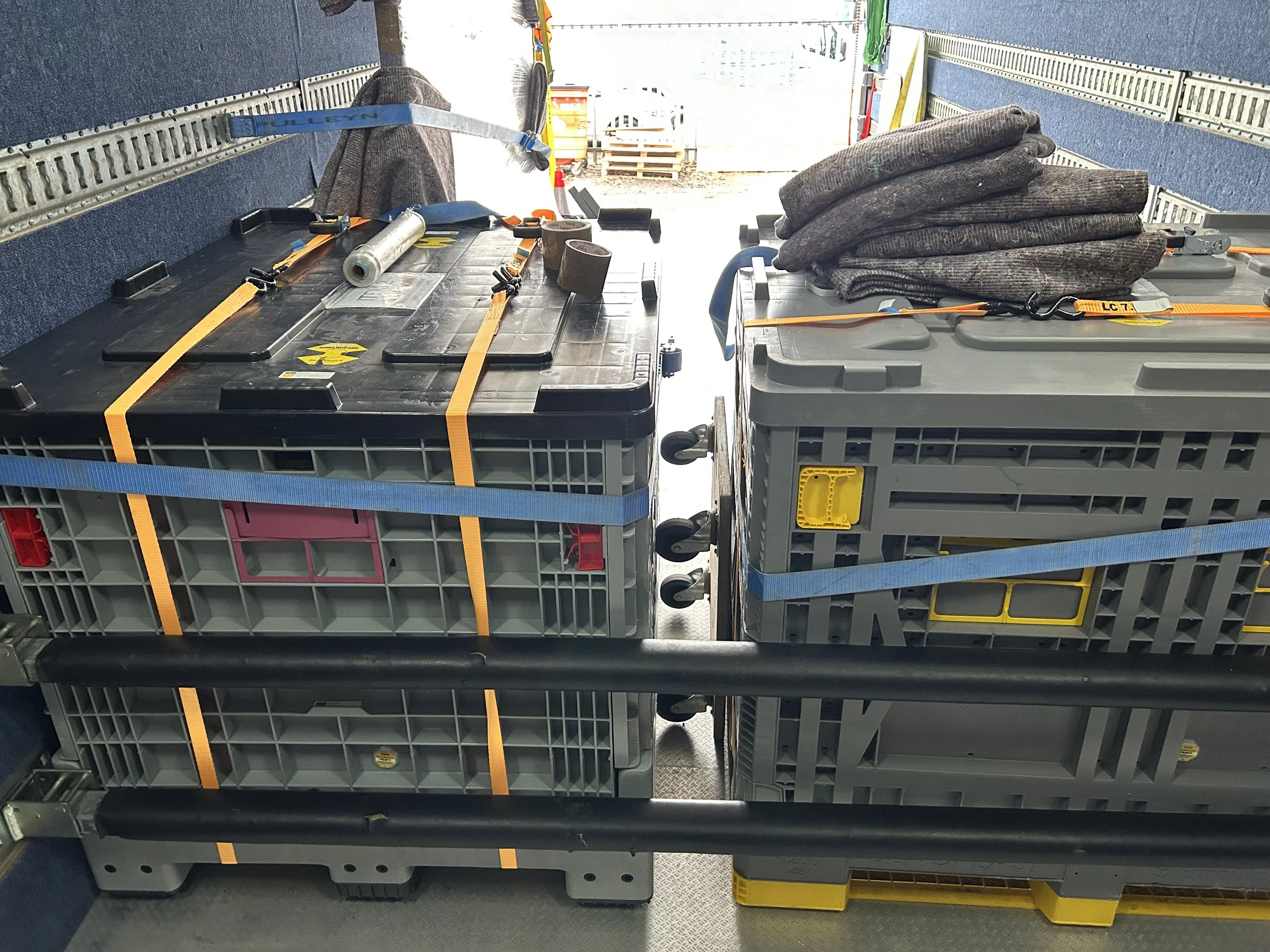Space Logistics Network: Covering everything from moving parts into satellite factories, to transporting completed spacecraft to launch sites
In a world where rockets and satellites grab the headlines, the work of getting them safely from factory to launch pad is less glamorous but no less vital. Space Logistics Network is proving that without robust, compliant, and innovative logistics, the commercial space age simply can’t fly.
Two decades ago, Ralph Perkins founded the Aviation Logistics Network (ALN), a consortium designed to solve one of the aviation industry’s most pressing challenges: ensuring aircraft parts reached engineers anywhere in the world, whenever they were needed. Starting with partners in Germany, France and the UK, ALN steadily expanded to over 400 locations globally, operating 24/7 and keeping airlines flying through highly compliant, time-critical logistics.
SLN Team taken at Space Comm London
That experience has now given rise to its natural successor, the Space Logistics Network (SLN). Born during the pandemic, when commercial aviation all but paused, Ralph and his team used the time to research the space sector in depth. What they discovered was a rapidly evolving industry where logistics was often overlooked until late in the process – sometimes too late. With the growth of low Earth orbit satellites, new launch opportunities, and the commercialisation of space, there was a clear need for a specialist network that could simplify the complex supply chains of the space sector.
SLN today is a consortium of specialist providers, drawing on the expertise of ALN but adapted for the very different needs of space. The network offers a single source of logistics expertise covering everything from moving parts into satellite factories, to transporting completed spacecraft to launch sites. In practice, this means addressing some of the most common pain points companies face.
Take packaging. Satellites and instruments often contain materials that need special handling such as lithium batteries, compressed gases, sensitive electronics. “People are rightly focused on designing the technology,” Ralph says. “What they don’t always realise is how tightly regulated the shipping of those components is. If you don’t pack and declare them correctly, they won’t even get on an aircraft.” Then there’s the issue of export licences. With many components falling under dual-use regulations, the paperwork can be as complex as the engineering.
Shows 2 small systems loaded on to specialist truck , correct stowage and strapping and also internal temp control and shock monitoring are all performed and monitored in the truck
And then there’s the transport itself. Space hardware, even at CubeSat scale, represents millions in investment. SLN is already operating temperature- and humidity-controlled vehicles designed to move sensitive equipment, and the next step is more ambitious still: trucks that are clean rooms in their own right, complete with specialist airlocks. “That way you can take something straight from a clean room at the factory into a clean room on wheels,” Ralph explains. “It’s about giving our clients absolute confidence that their payload will arrive exactly as it left.”
What makes SLN distinctive is its ability to bring every piece of the logistical jigsaw together under one roof. Rather than leaving satellite manufacturers, launch service providers or component suppliers to find their own way through packing requirements, customs procedures or shipping limitations, SLN integrates each stage into a cohesive solution. The emphasis is on early engagement: companies gain the most value by involving SLN at the very beginning of a project, avoiding costly redesigns or transport headaches further down the line.
Already, the company has transported satellites to launch sites successfully, proving the concept works. SLN’s footprint now stretches across 50 countries, covering all the key centres of growth in the space economy including the US, Canada, Germany, France, Singapore, the UAE, Australia and beyond.
Collaboration with industry clusters has been vital. Ralph credits Space South Central with playing a “fundamental” role in SLN’s success, facilitating introductions that have already resulted in commercial agreements. “One of the most fruitful hours I’ve spent on this whole project was sitting down with Dr Louise Butt [Director of Space South Central]. Her knowledge, enthusiasm and connections have been invaluable.”
Looking ahead, in the near term the company is investing in bespoke transport solutions, including its clean-room truck concept. By 2026, Ralph wants to see SLN equipment supporting UK-based launches, an ambition he believes is well within reach given the country’s newly licensed spaceports in Scotland and Cornwall. “It would be a proud moment to see a satellite we’ve handled heading into orbit from a UK pad.”
Further out, the aim is profitability backed by steady growth, supported by the financial strength of the Davies Turner Group, one of Britain’s oldest freight forwarding businesses, still family-owned after more than 150 years.
Despite this long-term view, SLN remains firmly focused on the practical challenges of today’s space industry. The message Ralph is keen to leave with prospective clients is simple: don’t treat logistics as an afterthought. “Don’t wait until you’ve built your satellite to think about how you’ll move it. Too often, companies come to us at the end of the process with a satellite ready to ship, only to discover it’s oversized for available aircraft, or packed with hazardous components that haven’t been declared. That can mean delays, costs, even redesigns. By thinking about logistics earlier, you avoid costly mistakes and delays. Come and talk to us before you start, not once it’s finished.”


